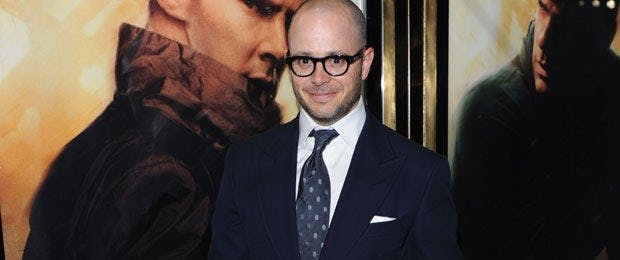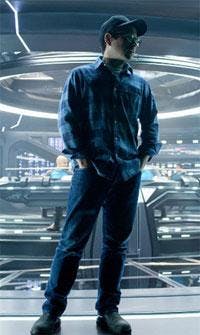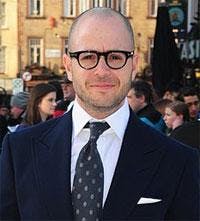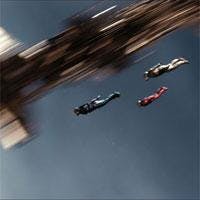Published May 7, 2013
EXCLUSIVE INTERVIEW: Damon Lindelof, Part 2
EXCLUSIVE INTERVIEW: Damon Lindelof, Part 2

Damon Lindelof has a lot on his plate right around now. He’s promoting Star Trek Into Darkness, which he co-produced and co-wrote, and in the works or on the way are Tomorrowland, World War Z and The Leftovers. StarTrek.com chatted recently with the talkative, amiable Lindelof and picked his brain about most of the above, as well as about J.J. Abrams directing the next Star Wars

. He knows exactly what he wants. That said, he’s also incredibly collaborative. So, whether it’s with the cast or with us, he’s constantly huddling up between takes, trying to get a sense of whether or not he got it. That’s a lot of fun and really exciting.How shocked were you by the announcement that J a Star Trek adventure?LINDELOF: J.J. never says, “I’m definitely going to direct this movie.” He was going to be involved as a producer on Star Trek Into Darkness, but it was really our job as fellow producers and writers to make the script undeniable for him. Once he committed to it, he committed all the way. It was a very surreal experience, sitting there on the first day of Star Trek Into Darkness, where we’d basically built the entire interior of the Enterprise again, knowing that four years had passed, but feeling like no time had passed. The same people were there. He settled right in and it was with the same level and enthusiasm that he did the first one. J.J. is an enormously confident director. He knows exactly what he wants. That said, he’s also incredibly collaborative. So, whether it’s with the cast or with us, he’s constantly huddling up between takes, trying to get a sense of whether or not he got it. That’s a lot of fun and really exciting.How shocked were you by the announcement that J. J. was going to

did the first one. J.J. is an enormously confident director. He knows exactly what he wants. That said, he’s also incredibly collaborative. So, whether it’s withdirector. He knows exactly what he wants. That said, he’s also incredibly collaborative. So, whether it’s with the cast or with us, he’s constantly huddling up between takes, trying to get a sense of whether or not he got it. That’s a lot of fun and really exciting.How shocked were

s after this thing has happened, and society is struggling with whether or not they’re supposed to change their ways or just go back to the way things were. It’s kind of a family drama that takes place under those circumstances. If the pilot works out, hopefully that series will be the next four or five years of my liffore you did. I don’t think that’s because he was keeping secrets from his close friends. I think that’s just the nature of the business. If he’d told me five days early, people would have said, “Well, how come Lindelof knew and I didn’t?” So you have to play these things incredibly close to your chest. If anybody understands that, it’s me.Let’s revisit Star Trek (2009) for a few minutes. It had a lot of heavy lifting to do – kick-start a dormant franchise, stand on its own and, at the same time, please Trek fans and attract/entertain newcomers. How satisfied, in hindsight, are you with how the first film pulled all that off?LINDELOF: We were really happy with the way that it turned out. I think that the goal was to make a movie that hardcore Trek fans, who’d been sort of followers of this amazing world for over 40 years, could feel deserved a place inside that canon. Then, also, we were trying to make a movie that people who thought they knew what Trek was and hadn’t been interested in it before, and were sort of dragged to the theater kicking and screaming about it, left the theater converts. That was the job, and if anybody said, “Wow, this was cool. I should check out The Original Series,” as a result of seeing our movie, then it was mission accomplished. We were starting to hear things like that. We’re not really filmmakers who ever high-five and feel like the cat that ate the proverbial canary, but we were proud of the way that Star Trek (2009) turned out.To play Devil’s advocate for a moment, some fans felt there was too much action and not enough Star Trek-style humanity in Star Trek (2009). What are your thoughts on the matter?LINDELOF: There’s a certain part of our jobs, especially when you’re working on something as revered and as loved and as defended as Star Trek has been over the years, where we knew that going in there were going to be plot points and filmmaking decisions that we were making that were going to upset people. Every single one of them was weighed with great deliberation, and there were some things that we were considering doing that we decided not to do and some things we ended up doing because, ultimately, we sort of had to answer to ourselves. We had to make the best movie that we knew how to make. We knew that that Venn diagram of pleasing all the fans just didn’t exist. But there were plot points that we talked about, specifically the destruction of Vulcan or Spock and Uhura and their romantic relationship, where we just said, “No matter how well we execute these ideas, the ideas themselves are just going to be rejected by certain people.” And I also think that the idea of rethinking Trek slightly… I don’t think of it as an action movie, and I certainly think there’s a tremendous amount of humanity in our movie. But you can do that AND have action, and that was always the goal. Trek has a heart and a soul and a brain. Those were the things we felt like we needed to honor. In addition to those things, we can up the heartbeat, we can be meditative about the soul and still try to make a thinking person’s piece in the storytelling.Our guess is that there will be a third Star Trek adventure with this cast and made by the Bad Robot team. How involved do you hope to be in it?LINDELOF: That’s a very tricky question because, obviously, J.J. is now committed to Star Wars and, personally speaking, for me, the part of the job I’ve loved most is working with this group of people. So, if that is going to change dramatically, I don’t know what my future involvement in Trek is going to be.Does that mean you’d move on to Star Wars?LINDELOF: No, no. I’ve got this movie, Tomorrowland, that I’m doing at Disney with Brad Bird and George Clooney, that’s taking up a lot of my time now. That starts shooting in the summer. Then I have this HBO pilot that I’m producing. And just between those two things and the press for Star Trek Into Darkness and having a family, I don’t have a second to spare. I’m just trying to put one foot in front of the other for now. Hopefully, if people like Star Trek Into Darkness and they want the same team involved moving forward, that’s definitely something that I would be honored to do, but I don’t want to count my chickens before they’re hatched.The HBO pilot you mentioned is an adaptation of The Leftovers. What intrigued you enough about the Tom Perrotta book to want to make it into a show?LINDELOF: Perrotta also wrote Election and Little Children, amongst other fantastic novels, and this was his first toe dip into genre waters. I read the book and just fell in love with it. So he and I wrote an adaptation of the book for HBO, and we hope to be shooting the pilot in the late spring or early summer. It’s essentially about The Rapture happening; or that’s what people think it is. About 2 percent of the world’s population simultaneously disappears and there doesn’t seem to be any rhyme or reason to who disappeared. It’s not just good people or God-fearing Christians. It’s people from all walks of life, some of whom are not nice at all. The book starts 3 years after this thing has happened, and society is struggling with whether or not they’re supposed to change their ways or just go back to the way things were. It’s kind of a family drama that takes place under those circumstances. If the pilot works out, hopefully that series will be the next four or five years of my life.
Click HERE to read part one of our interview Damon Lindelof.

